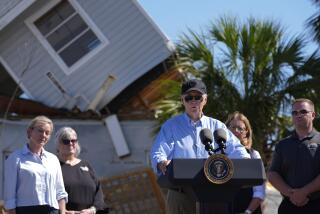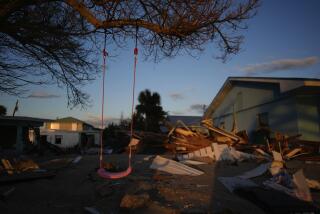Hurricane Sandy: Northeast struggles to its feet as sun comes out
SEA BRIGHT, N.J. — President Obama and New Jersey Gov. Chris Christie, an unlikely pair thrust together by a national crisis, toured ravaged stretches of the coast Wednesday. The sun came out, the stock exchange reopened and the electricity crisis ebbed — but the rolls of the dead rose, and some areas were still coming to grips with Sandy’s staggering destruction.
In pockets of New Jersey, in particular, the storm’s scope was just becoming clear.
Half of Hoboken, N.J., birthplace of baseball and Frank Sinatra, was covered with a stew of river water, sewage and oil. About 20,000 people were stranded in the flood but warned to stay put because of live wires. In little Union Beach, where a flood surge pulverized some houses, the principal of the local elementary school said it wouldn’t reopen for three weeks.
STATE BY STATE: Snow piles up; beaches wash away
Some small beachfront communities instituted new evacuation orders after gas leaks erupted amid the wreckage. In Sea Bright, a barrier-beach borough of 1,800 people south of Coney Island, officials labored to shut down gas lines.
“If we had a fire now, it would just burn,” said Sea Bright’s emergency management coordinator, Danny Drogin. “All it takes is someone lighting a cigarette.” Of Sandy, he offered this assessment: “It’s like Katrina without alligators. The damage is catastrophic.”
There were numerous signs, however, of relief and reinforcement.
VIDEOS: East Coast hit by deadly storm
The Pentagon said more than 10,000 National Guard troops in 13 states had been mobilized. The deployment included 10 Blackhawk helicopters, 100 pumps sent to New York to siphon water from tunnels, about 120 medical personnel and 573 vehicles. Forty Humvees were on their way from Ft. Drum in upstate New York.
Five hundred U.S. Department of Health and Human Services workers arrived to provide emergency medical care and public health assistance. Nearly 2,000 utility workers were on their way to Long Island from states as far-flung as California and Texas.
Military trucks lumbered into one town after another, ferrying food, water and generators, and going door to door in Hoboken to rescue stranded residents.
“There’s been so much anxiety,” said Kim Giddens, who has lived in Hoboken, across the Hudson River from Manhattan, for nine years. Portions of the city have long been flood-prone, but “this is worst it’s ever been,” she said.
Obama offered additional military assistance, including a Navy ship and transport planes, and said he had made a “15-minute rule” — meaning that every call placed to the White House by a mayor or a fire chief would be returned within 15 minutes.
“If they need something, we figure out a way to say yes,” the president said. Obama said four states — New Jersey, New York, Connecticut and West Virginia — had shouldered the worst of the storm, and the region’s first priority was restoring power. About 5.9 million homes and businesses were without power Wednesday, down from about 8.5 million at the height of the crisis.
“We are here for you,” the president said in New Jersey, in front of three boats stacked atop one another in the middle of the street. “We will not forget.”
Obama, in hiking boots, and Christie, in white sneakers, greeted each other warmly on the Tarmac in Atlantic City, N.J., a few miles north of the spot where the 1,000-mile-wide storm landed Monday. Their aerial tour of the damage lasted for much of the day.
From Marine One, the president’s helicopter, they stared down at the ruins — floodwater churning below a gnarled roller coaster, boardwalks and piers that looked as if they’d been chewed up. In Seaside Heights, N.J., between Atlantic City and New York City, flames burned unchecked in one abandoned neighborhood.
Obama and Christie continued their tour on the ground, including a long stop at a community center and marina in Brigantine, N.J., just north of Atlantic City. As storm victims poured out of homes and businesses, the president and governor offered hugs and reassurance. At one point, Obama stopped so that an eighth-grade boy could show him a video of the storm, which had folded up a garage door like an accordion.
“It was scary,” the boy told Obama.
Both men have insisted that Sandy’s scope has made politics immaterial. Christie, with typical bravado, said he didn’t “give a damn about election day,” and had “bigger fish to fry.” But Wednesday had unmistakable political undertones, and it came less than a week before the presidential election.
Obama is a Democrat, and Christie is not just any Republican — he is a top surrogate for Mitt Romney’s campaign and was keynote speaker at the Republican National Convention this summer. He spent months filleting Obama’s presidency, and as of last week, when Sandy was already headed across the Atlantic, was still likening Obama to a naif, groping in the dark for a light switch.
Then the storm hit, and Christie has been singing the president’s praises ever since.
“I cannot thank the president enough,” Christie said Wednesday. Of the president’s pledge to provide support until the Northeast rebuilds, Christie said: “I know he means it.”
Obama returned the love on Wednesday, singling out Christie’s “extraordinary leadership.”
“He has put his heart and soul into making sure that the people of New Jersey bounce back,” the president said.
The “partnership” between Obama and Christie, as the president put it, has prompted tea-leaf-reading in the chattering classes, and no small amount of grumbling on the right. Some commentators labeled the governor “Judas Christie,” and Rush Limbaugh, a leading conservative voice, called Christie “fat and a fool.”
Romney campaigned in several Florida cities Wednesday, and both candidates will be back in full swing on Thursday. Obama, who canceled three days of campaigning because of the storm, will try to compensate with a sprint through at least seven states by the end of the weekend.
Also Wednesday, Sandy’s U.S. death toll rose to 63, over and above the 69 people killed in the Caribbean. In the United States, the new victims added to the storm’s grim tally included a state legislative candidate in West Virginia who was killed during a blizzard, apparently by a falling tree.
John Rose was a Republican candidate for the House of Delegates. Elections officials said it was too late to remove his name from Tuesday’s ballot. If he wins, they said, a GOP committee will submit three names to Gov. Earl Ray Tomblin, a Democrat, who will make an appointment.
In New York, Gov. Andrew Cuomo announced that limited commuter rail service would resume immediately, with some subway service going back on line Thursday. Some Long Island Railroad and Metro North trains were scheduled to resume Wednesday afternoon, and subway service between Brooklyn and Manhattan — a critical commuting corridor — was expected to return Thursday afternoon.
Those were signs of gradual progress — such as the sight of Mayor Michael R. Bloomberg ringing the bell to reopen normal trading on the floor of the New York Stock Exchange.
But an exhausting slog lay ahead for the city, America’s largest by far. Lower Manhattan, from Wall Street to 34th Street, remained without power. Dark floodwater sat stagnant in miles of century-old subway tunnels. Bloomberg announced that the city’s public schools would be closed until Monday morning at the earliest.
“We’re going to need patience and tolerance,” Cuomo said.
Patience was not always evident Wednesday. Tempers flared during food and water distribution in Hoboken, and some New Yorkers have pointed to a continued lack of resources in Lower Manhattan. But even in some of the hardest-hit beach towns, the message was beginning to sink in.
In Sea Bright, Bill Rhee, 40, and his fiancee, Jessica Henderson, 27, hauled their cat, Stella, and their property out of town in handcarts. They had stayed home for the storm and managed to save most of their belongings, despite waist-high water inside their house.
“I just need new walls, new floors and new water heaters,” said Rhee. He was confident businesses would rise again. “They’ll just build them up higher,” he said.
In Babylon, on Long Island, as the rain subsided and the sun came out, residents emerged from waterlogged homes to dry out and share tales of survival. At the height of the storm, Elizabeth Scoyen, 57, a retired teacher, found herself in knee-deep water, in the pitch black, with loose boats floating past her windows.
“There was a fish in my kitchen,” she said, as she arranged soaked chair cushions in the open air. “That is when I knew: This was going to be bad.” Surviving the storm, she said, was “the blessing of my life.
molly.hennessy-fiske@latimes.com
Hennessy-Fiske reported from Sea Bright, N.J., Bennett from Babylon, N.Y., and Gold from Los Angeles.
Staff writers David S. Cloud, Noam Levey, Kathleen Hennessey, Michael Muskal, Joseph Serna, Richard Simon and Tina Susman contributed to this report.
ALSO:
Fact breakdown on super storm Sandy
Candidate killed in storm; felled by tree in West Virginia
After Sandy: New York sets plan to restart some rail, subway lines
More to Read
Sign up for Essential California
The most important California stories and recommendations in your inbox every morning.
You may occasionally receive promotional content from the Los Angeles Times.













